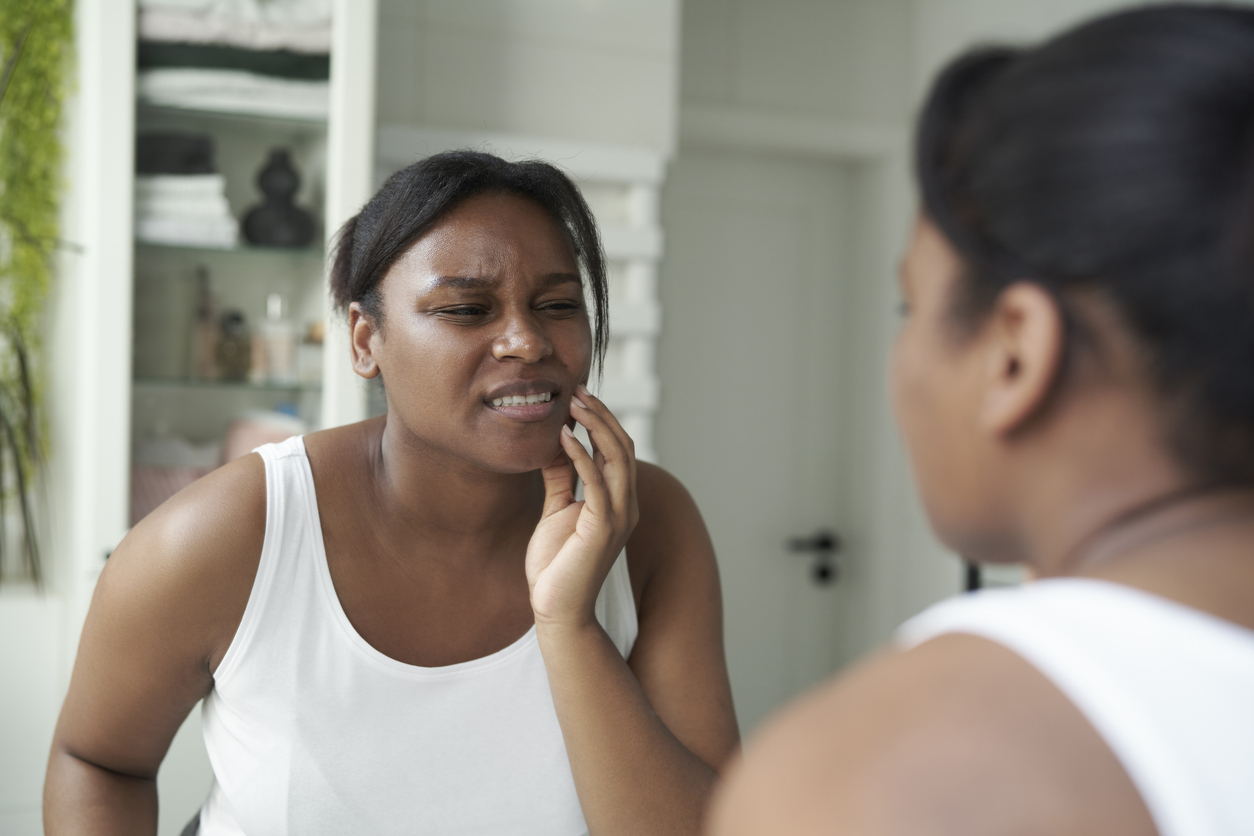Some patients might not even realize that they grind their teeth at night when sleeping. This condition is called bruxism and can cause various health-related issues. It is important to identify bruxism as early as possible to avoid additional complications and get appropriate treatment from your friendly family dentist. In this article, we will discuss the most common symptoms that indicate bruxism and the long-term effects of teeth grinding.
Symptoms Indicating You Might Grind Your Teeth
Symptoms that might indicate that you unconsciously grind your teeth are associated not only with the teeth themselves but can manifest in different parts of your body:
Head
- Chronic headache in the forehead or temples
- Migraines
- Sinus type pain
- Shooting pain in the back of the head
- Pain when touching hair or scalp
Eyes
- Pain behind the eyes
- Red or bloodshot eyes
- Eyes sensitive to sunlight
Mouth
- Limited opening of the mouth or inability to open it smoothly
- Mouthlocks in a shut or open position
Jaw
- When opening your mouth, your jaw deviates to one side
- Clicking or popping sound when opening the mouth
- Muscles pain in cheeks
- Discomfort or pain when speaking, chewing, or moving the jaw
- Uncontrollable movements of the jaw
Teeth
- Sore or loose teeth, especially the back teeth
- Increased sensitivity to hot and cold temperatures or air
Neck
- Pain or stiffness in the neck
- Lack of mobility
- Sore muscles
Shoulders, Back, and Arms
- Back pain
- Soreness or pain in the shoulders
- Pain or numbness in arms and fingers
Ears
- Hissing, buzzing, or ringing
- Trouble hearing or decreased hearing
- Ear pain with no infection
- Clogged ears
Apart from these symptoms, you can also experience dizziness, a sore or clenched throat with no infection, swallowing difficulties, and voice changes. You might also wake up with a headache or pain in the jaw and neck. If you have symptoms of bruxism, visit your dentist as soon as possible to avoid further damage and chronic pain.
Long-term Effects of Teeth Grinding
Untreated bruxism has various long-term adverse effects on your health. Dental issues caused by teeth grinding include:
Permanent Teeth Damage
As a result of constantly grinding your teeth, they get worn out, shortened, and flattened. The longer you grind your teeth, the more severe the effects will be. Additionally, if you have any dental restorations like dental crowns, fillings, veneers, etc., teeth grinding can damage and cause them to fail as well.
TMJ Dysfunction
TMJ stands for temporomandibular joint. It attaches the lower jaw to the skull, giving it the ability to move. A human’s bite force is between 120 and 160 pounds per square inch, which means that teeth grinding consistently puts undue stress on the temporomandibular joint. Thus, bruxism can lead to dysfunction of the joint and cause chronic pain.
Tooth Sensitivity and Decay
Permanent tooth damage caused by bruxism also means enamel damage. Unfortunately, if enamel is worn off, it is impossible to restore or replace it. When the softer tissue of the teeth is exposed due to the lack of a protective layer, teeth become sensitive and vulnerable to harmful bacteria, which leads to cavities and tooth decay.
Gum Damage and Gum Disease
Bruxism also puts stress on the gums. The connective tissue that holds the teeth in their position can wear down or get damaged, leading to teeth mobility. In addition, the gum tissue can become red, inflamed, and vulnerable to bacteria.
Teeth Grinding Treatment
The cause and nature of bruxism can vary from patient to patient, and treatment methods can be chosen accordingly. However, the most common ways to deal with the issue include:
- Custom-made mouthguards hold teeth in one position while you sleep, preventing you from unconsciously grinding and clenching them. Wearing a mouthguard at night can also relieve the effects of TMJ dysfunction. We recommend getting a custom-made mouthguard, as it will be designed to fit your specific dental anatomy. Such mouthguards are much more comfortable and effective than store-bought ones.
- Some types of bruxism require neuromuscular dentistry treatments to establish proper alignment and function of the joint. These treatments can help eliminate neuromuscular strain caused by bruxism and TMJ dysfunction.
Other ways to reduce the severity of bruxism or relieve the symptoms might include:
- Physical therapy, yoga, stretches
- Counseling
- Muscle relaxants and nonsteroidal anti-inflammatory drugs
- Anti-anxiety medications
- Botox injections
Make an Appointment Today
Symptoms and effects of teeth grinding can significantly decrease the level and enjoyment of life. If you suspect that you or your child might have bruxism, do not hesitate to make an appointment at Glendora Family Dentistry. Our specialists will examine your case and offer effective treatment. We look forward to your visit!







